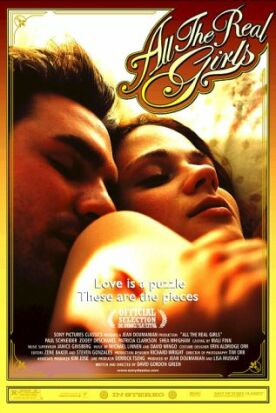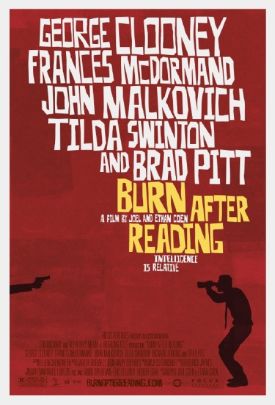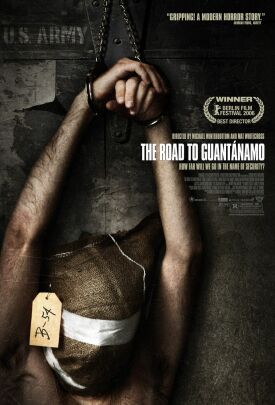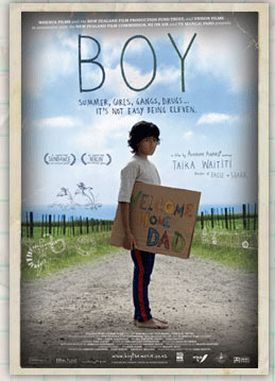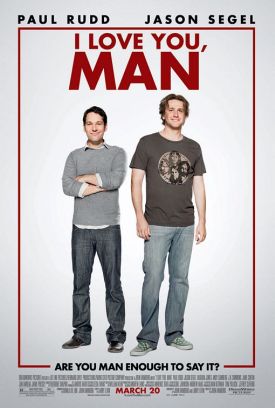All the Real Girls
All the Real Girls by David Gordon Green (George Washington) looks like a less-successful version of Kenneth Lonergan’s You Can Count on Me of a couple of years ago in presenting us with 20-somethings in small-town America who are drifting through the no-man’s land between childhood and adulthood with very little in the way of guidance from their elders. We might call these sibling-supporter movies, since they concentrate on intra-generational relations. But where Lonergan’s film quite deliberately focuses on the sibling relationship by taking the grown-ups out of the picture with an opening car-crash, Green’s leaves the absence of parents — apart from the hero’s mother, who seems hardly more grown up than he is, unexplained. It’s fair enough if he wants to concentrate on relationships within an age cohort, but it seems to me that the young people’s directionlessness is artificial when there are so few adult models.
Another difference between the two films is that, in All the Real Girls, there is not much of a plot, apart from boy-meets-girl, boy-loses-girl, boy-agonizes-about-girl. Noel (Zooey Deschanel) returns from a girls’ boarding school where she has been immured since she was 12 to a poor hamlet, dominated by a textile mill, in the mountains of western North Carolina. How, in this poverty-stricken environment she came to be at boarding school is not explained. Her only family appears to be a mentally retarded younger brother and a socially retarded older brother, Tip (Shea Whigham), whose concern — rather odd nowadays even in rural North Carolina one would have supposed — that she remain virgo intacta is only increased by his and his friends’ reputation for tomcatting around. Of course she falls for Paul (Paul Schneider), his best friend and the worst of the bunch for womanizing.
But Noel is a revelation to Paul, perhaps because at boarding school she was exposed to what must have looked to her like a more sophisticated way of thinking about “relationships” than that of the mill-town girls he is used to. “I like you ‘cause I can say what’s on my mind,” she says to Paul, proclaiming a by-now well-worn reverence for “openness” out of the 1960s which it is hard to believe still looks new even to someone like Paul, who appears never to have left this Carolina backwater. Noel is to him “not like the other girls,” and he is prepared not only to risk his friendship with Tip to court her but even to treat her with unwonted sexual consideration. It’s the awakening of a sexual predator to sensitivity and romance.
But Noel puts Paul’s new-found enthusiasm for psychological and sexual openness to an unexpected test, and he is plunged into even more soul-searching, and regrets for his treatment of women in the past. He sees the irony in being done to by “this virgin” as he has done to so many others, and suddenly he is unwilling to “go down in every girl’s history book as the a*****e ex-boyfriend.” This is all to the good, of course, and in the slightly ambiguous ending, we can be pretty sure that, along with a new willingness to commit, the quasi-therapeutic, confessional relationship inherited from hippiedom will be ultimately vindicated.
There is lots more going on in the background, but none of it is terribly interesting. Tip himself gets a girl pregnant and contemplates fatherhood, possibly even marriage.Yet another of Tip’s pals, called Bust-Ass (Danny McBride), also conceives a passion for Noel. Paul’s mother (Patricia Clarkson), who hates her life and to whom he is rather weirdly close, makes a living by donning a clown-suit and entertaining children, occasionally pressing Paul to put on a clown suit of his own and joining her; another, older friend, Leland (Benjamin Mouton), agonizes about getting back into a relationship after the death of his wife. But it is all too slow and meandering, like the rhythms of life in rural North Carolina, perhaps.
This slow pace is a hint that the film’s problem lies in its earnestness, its taking too seriously the familiar and therefore only moderately interesting life passages of only moderately interesting people. Oh dear! They’re not sure what they want out of life! Oh my! They’re afraid of commitment! Oh golly! They’re worried about the future! The film just doesn’t give us enough reason to care.
Discover more from James Bowman
Subscribe to get the latest posts to your email.

